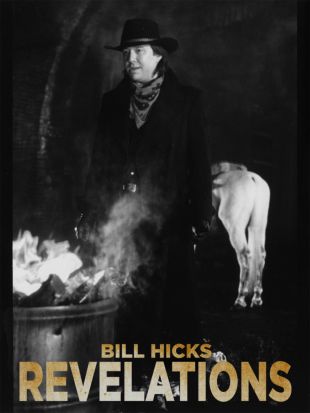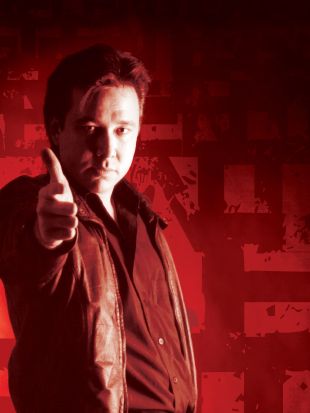Considered by many to be one of the sharpest social satirists/comedians to have ever graced the standup stage, Bill Hicks offered audiences something more than simple laughs -- he offered a new perspective. Always pushing boundaries in hopes of making his audience question the status quo, Hicks' dangerous brand of standup drew comparisons to such comedy legends as Sam Kinison and Lenny Bruce, despite the fact that many Americans never heard of him during his short lifetime. If comedy were a weapon, Hicks' wit would have been a ten-ton nuclear warhead.
A native of Valdosta, GA, Hicks was raised in Houston from the age of seven. His first standup performance was at a church camp talent show, where Hicks' somewhat blue routine would leave audiences simultaneously shocked and doubled over in laughter. His energy only seemed to grow with each passing year, and by the time he had reached Stratford High School, his teacher would allot him a few minutes to entertain the class each day before lessons in hopes that he would get it out of his system. Staying up nights with friend Dwight Slade in order to refine his comedic universe, the lack of comedy clubs in Houston forced Hicks to innovate by sending videos of his routine to agents. The approach soon proved a success, and one such agent eventually booked Hicks on a 2:00 a.m. spot on the upcoming Jerry Lewis Telethon. Though Hicks' act had yet to develop the razor-sharp teeth of his later years, his wit and warmth were obvious to everyone lucky enough to catch his late-night routine, which would grow increasingly scathing and critical of social norms. His parents took him to a psychoanalyst at age 17, but the doctor found nothing wrong with the emerging comedian and even commented that he was probably in better mental health than they were.
In 1978 Hicks enrolled in a comedy workshop in Houston, and it was there that he made the acquaintance of comic Kinison and truly began to realize the power of anger in comedy. Hicks' family would relocate to Little Rock, AK, during his senior year of high school, and soon after graduating, Hicks made the move to L.A. to grace the stage with such comic greats as Jerry Seinfeld and Garry Shandling. Following an appearance in a short-lived sitcom entitled Bulba, Hicks hit the comedy circuit, where audiences were sometimes taken off guard by his confrontational style -- sometimes resulting in physical confrontations initiated by offended audience members. Hicks first appeared on David Letterman's late-night talk show in 1984, thanks to an arrangement made by fellow comic Jay Leno, and many more television appearances were soon to follow.
Though he would come dangerously close to losing himself to drugs, an invitation by Rodney Dangerfield to appear on Dangerfield's Young Comedian's Special launched Hicks' career and found him packing his bags for New York. It was at this point that Hicks and childhood friend Kevin Booth formed Sacred Cow Productions to bring Hicks' act to film and albums. Though Hicks would eschew drugs after realizing that he was on the brink of a dangerous addiction, his cigarette smoking only increased during this period (one of Hicks' favorite jokes was that he went through two lighters a day). In November of 1990, British audiences were first introduced to Hicks' unique brand of comedy, thanks to a six-week engagement at London's West End entitled Stand Up America, and his dry and insightful wit (not to mention his searing commentary on the state of the U.S.) immediately won him many fans in the U.K. Hicks received the Critics Award at the Edinburgh Festival the following year, and his perception-altering perspective smashed boundaries and increasingly gained exposure due to his tireless touring schedule. It was also around this time that Hicks met and fell in love with his new manager, Colleen McGarr.
Though everything seemed to be coming together for Hicks, in June of 1993, he was diagnosed with cancer after being plagued with recurring sharp pains in his left side in previous months. Though many might have lain down and hoped for the best at this point, Hicks told only the closest of friends and shifted into overdrive to produce some of his angriest material yet. His final appearance on the Letterman show came on October 1, 1993, and true to form, Hicks remained as eviscerating and insightful as ever. His routine, critical of pro-lifers, was ultimately cut from the broadcast due to corporate protest. Later that same year, it was obvious that his health was failing, and after moving back into his parent's Arkansas home, Hicks performed his final standup act in January of 1994 in New York. Spending his final days surrounded by family, Hicks grew ever closer to his mother and father, playing them music and films and attempting to persuade his father to try hallucinogenic mushrooms, while growing increasingly peaceful and accepting of his impending death. At the time of his death in February of 1994, Hicks was only 32. In addition to numerous appearances in standup comedy videos, Hicks also directed and starred in the 30-minute feature Ninja Bachelor Party (1991).


